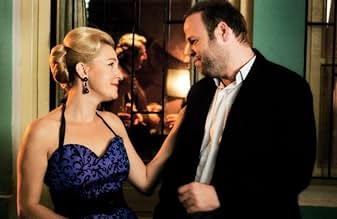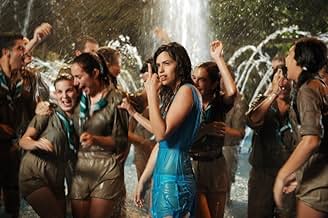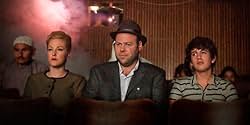During the summer of 1968 a teenage boy goes to work for a matchmaker who has survived the Holocaust - both their lives are forever altered.During the summer of 1968 a teenage boy goes to work for a matchmaker who has survived the Holocaust - both their lives are forever altered.During the summer of 1968 a teenage boy goes to work for a matchmaker who has survived the Holocaust - both their lives are forever altered.
- Awards
- 4 wins & 7 nominations total
Yarden Bar-Kochba
- Nili Burstein
- (as Yarden Bar Kochva)
Yael Levental
- Tikva Abadi
- (as Yael Leventhal)
Kobi Farag
- Moshe Abadi
- (as Kobi Faraj)
Eyal Shehter
- Arik Burstein (Adult)
- (as Eyal Schechter)
Ya'ackov Bodo
- Advocate Segelson
- (as Yaacov Bodo)
Ben Kippris
- Yoram
- (as Ben Kipris)
- Director
- Writers
- All cast & crew
- Production, box office & more at IMDbPro
Featured reviews
10zaaq
1. Not the greatest actors and accents but it boasts carefully written dialogue, captivating characters, and an aesthetically pleasing 70's summer vibe of the region.
2. This movie packs dating angst and teenage nostalgia (for today's boomers), which isn't difficult to relate - mandela effect, anyone? ;P
3. The plot has a nice pace (no stalling/filler imo) and there are moral lessons all along the way. Some lines even came back to me just now; so I decided to recommend it.
Please let me know if you liked me review, it helps :) Thanks
2. This movie packs dating angst and teenage nostalgia (for today's boomers), which isn't difficult to relate - mandela effect, anyone? ;P
3. The plot has a nice pace (no stalling/filler imo) and there are moral lessons all along the way. Some lines even came back to me just now; so I decided to recommend it.
Please let me know if you liked me review, it helps :) Thanks
This film is a success on several levels. First of all, it is an engrossing drama and coming of age story and second it recreates a time and place long gone. The coming of age story involves a 16 year old boy's contact with a warm hearted but slightly sleazy character from his father's youth. Perhaps I related to this young man because I too, at the age of 16, had a similar character in my life. And life after all, is about learning to deal with various situations, some of which have to potential to corrupt you, but all of which are learning experiences. Many films present a story, but do not give you a reason to care about the characters. This film fully develops the characters and, consequently, give you a reason to care about their outcomes. Some reviews have a criticized a sub plot involving a beautiful young women. Really, were you ever a 16 year old boy?. Is it possible to have a story about a 16 year old and not have sex in it?
I also liked the recreation of 1968 Israel, a place and time I never saw even though I was offered a summer kibbutz experience as a 16 year old in 1969. The Hebrew name of the film translates as "Once I was". The Israel of today, which I know well (I learned to speak Hebrew as an adult), is very different, in some ways better and some ways worse. I cannot speak for the authenticity of the recreation, but the film certainly captured some of the major conflicts in the society without ever devolving to into an anti-Israel film.
The original name was a good choice and is more descriptive. Overall, this film is a success as a drama and as an historical essay.
I also liked the recreation of 1968 Israel, a place and time I never saw even though I was offered a summer kibbutz experience as a 16 year old in 1969. The Hebrew name of the film translates as "Once I was". The Israel of today, which I know well (I learned to speak Hebrew as an adult), is very different, in some ways better and some ways worse. I cannot speak for the authenticity of the recreation, but the film certainly captured some of the major conflicts in the society without ever devolving to into an anti-Israel film.
The original name was a good choice and is more descriptive. Overall, this film is a success as a drama and as an historical essay.
The Israeli movie Once I Was (Pa'am Hayiti) was shown in the US with the title The Matchmaker (2010). It was written and directed by Avi Nesher. The film was very popular in Israel, where it won four Israeli Academy Awards. The other reviewers of this film are either Israelis or are familiar with Israeli culture, so they can do a better job than I can discussing the reality of the movie. For example, it is set in the seaport of Haifa in 1968, and there are questions about the authenticity of the sets and the accents. I will leave these topics to the experts.
I'm reviewing the film more on its plot and acting. The plot is fascinating. A Holocaust survivor, Yankele Bride (Adir Miller) is a smuggler and petty criminal. That's his profession, but his hobby is matchmaking. His job is to find mates for people who, for whatever reason, are considered undesirable.
The saddest of these people is a young woman, Sylvia, who is very beautiful but has achondroplasia. (The role is played by the extraordinary actress Bat-El Papura.) Sylva wants to be married, but no person of normal height will consider her as a spouse. Even the hapless character called Meir the Librarian turns away from Sylvia when he meets her. Yankele does his best for her, but he never succeeds.
The most obvious theme of the movie is a coming-of-age story of Arik Burstein (Tuval Shafir), whose father is also a Holocaust survivor. Arik starts work as Yankele's "spy," the person who checks out the matchmaker's clients to make sure that they are who and what they say they are. (There's another theme about a visiting American cousin, who is a liberated young woman, but that subplot never goes anywhere.)
The key theme, as I saw it, is that Holocaust survivors were welcomed to Israel, but they weren't admired or honored. As Arik's father says, "people always want to know what we had to do in order to survive." The clash of cultures--eastern European survivors who were seen as victims vs. Israelis who had fought for independence--is in the background of the entire movie. (Sometimes this clash is overt, sometimes it's subtle, but it's always there.)
Of course, Arik is impressed by the brash, streetwise Yankele, as opposed to his own quiet, respectable father. We are supposed to be impressed by Yankele too, because his criminal activities are treated as amusing foibles. I don't think that smuggling goods into Israel was an appropriate way to thank the country that took you in, but he is definitely a likable character in the movie. Each viewer will have to decide about Yankele for herself or himself.
I liked this film well enough to suggest that it's worth seeing if it comes along. I'm not sure it's a movie I would seek out for viewing. We saw The Matchmaker at the excellent Rochester Jewish Film Festival, screened at the wonderful Dryden Theatre at George Eastman House. It will work equally well on a small screen.
I'm reviewing the film more on its plot and acting. The plot is fascinating. A Holocaust survivor, Yankele Bride (Adir Miller) is a smuggler and petty criminal. That's his profession, but his hobby is matchmaking. His job is to find mates for people who, for whatever reason, are considered undesirable.
The saddest of these people is a young woman, Sylvia, who is very beautiful but has achondroplasia. (The role is played by the extraordinary actress Bat-El Papura.) Sylva wants to be married, but no person of normal height will consider her as a spouse. Even the hapless character called Meir the Librarian turns away from Sylvia when he meets her. Yankele does his best for her, but he never succeeds.
The most obvious theme of the movie is a coming-of-age story of Arik Burstein (Tuval Shafir), whose father is also a Holocaust survivor. Arik starts work as Yankele's "spy," the person who checks out the matchmaker's clients to make sure that they are who and what they say they are. (There's another theme about a visiting American cousin, who is a liberated young woman, but that subplot never goes anywhere.)
The key theme, as I saw it, is that Holocaust survivors were welcomed to Israel, but they weren't admired or honored. As Arik's father says, "people always want to know what we had to do in order to survive." The clash of cultures--eastern European survivors who were seen as victims vs. Israelis who had fought for independence--is in the background of the entire movie. (Sometimes this clash is overt, sometimes it's subtle, but it's always there.)
Of course, Arik is impressed by the brash, streetwise Yankele, as opposed to his own quiet, respectable father. We are supposed to be impressed by Yankele too, because his criminal activities are treated as amusing foibles. I don't think that smuggling goods into Israel was an appropriate way to thank the country that took you in, but he is definitely a likable character in the movie. Each viewer will have to decide about Yankele for herself or himself.
I liked this film well enough to suggest that it's worth seeing if it comes along. I'm not sure it's a movie I would seek out for viewing. We saw The Matchmaker at the excellent Rochester Jewish Film Festival, screened at the wonderful Dryden Theatre at George Eastman House. It will work equally well on a small screen.
Star Adir Miller plays Holocaust survivor Yankele Bride, a shady matchmaker with some mysterious operations on the side. He takes on a wide-eyed young apprentice, Arik (Tuval Shafir), who just wants an easy summer job. Naturally, the boy gets more than he bargained for in this classic tale of an ordinary man thrust into an extraordinary situation.
Miller, a veteran television actor, writer, and producer, is captivating (and a dead ringer for Vincent D'Onofrio). He dominates the screen, masterfully orchestrating the actors, and action, in every scene he's in. Shafir plays the streetwise assistant with a magnetic vulnerability that charms everyone who crosses his path. He's quite experienced himself as a teen idol in his native country, having grown up on Israeli TV as the star of a long-running hit series.
Writer/director Avi Nesher is a true veteran (this is his 16th feature), and it shows. Production values are high, befitting a director considered an icon of Israeli cinema. Veteran cinematographer Michel Abramowicz effectively captures the dramatic landscape of this Mediterranean port city, filled with bright blue skies, lush vegetation, and sweeping mountain vistas. "The Matchmaker" uses multiple locations, both exterior as well as interior. Arik's youthful world is brightly lit with a vibrant primary color palette -- not the pale, washed out blues and grays typical of modestly budgeted European films. In contrast, the seedy underbelly of the city within which Yankele operates is ominously dark and dusty, filled with shadows and potential dangers lurking around every corner.
Although set in Haifa in 1968, "The Matchmaker" could easily be a classic American noir thriller-cum-coming-of-age dramatic comedy. The evocative soundtrack of original late 60s songs is a plus (Steppenwolf's "Magic Carpet Ride," Jefferson Airplane's "White Rabbit"). Definitely worth repeat viewings.
Miller, a veteran television actor, writer, and producer, is captivating (and a dead ringer for Vincent D'Onofrio). He dominates the screen, masterfully orchestrating the actors, and action, in every scene he's in. Shafir plays the streetwise assistant with a magnetic vulnerability that charms everyone who crosses his path. He's quite experienced himself as a teen idol in his native country, having grown up on Israeli TV as the star of a long-running hit series.
Writer/director Avi Nesher is a true veteran (this is his 16th feature), and it shows. Production values are high, befitting a director considered an icon of Israeli cinema. Veteran cinematographer Michel Abramowicz effectively captures the dramatic landscape of this Mediterranean port city, filled with bright blue skies, lush vegetation, and sweeping mountain vistas. "The Matchmaker" uses multiple locations, both exterior as well as interior. Arik's youthful world is brightly lit with a vibrant primary color palette -- not the pale, washed out blues and grays typical of modestly budgeted European films. In contrast, the seedy underbelly of the city within which Yankele operates is ominously dark and dusty, filled with shadows and potential dangers lurking around every corner.
Although set in Haifa in 1968, "The Matchmaker" could easily be a classic American noir thriller-cum-coming-of-age dramatic comedy. The evocative soundtrack of original late 60s songs is a plus (Steppenwolf's "Magic Carpet Ride," Jefferson Airplane's "White Rabbit"). Definitely worth repeat viewings.
8Nozz
When they came to Israel, survivors from Nazi Europe did not manage to leave their emotional scars behind.
Even decades later, they found themselves misunderstood by those who had not been "there" in Europe, but in some cases (at least as portrayed in this movie) they thought of love as the great healer and pursued it. They pursued individual love, not free love or universal love, so it is strange that the movie adds a subplot, with an explicit contrast, about the first stirrings of imported Woodstock culture in Israel. Too much, I think. I would rather have seen the story take place ten years earlier and leave out the counterculture. Two cultures, that of the European-born and that of the Israeli-born, would have been contrast enough. I would also rather have seen less effort put into a reconstruction of a square in the Haifa port area that makes it look too vibrant, too colorful, too Fellinesque. (This may be the first Israeli movie that would have benefited from a smaller budget.) But when the movie is on-topic and concentrates on the adult characters rather than on the dream-Haifa set, the period props, or the invasion of American music, it works very well and with the help of some admirable actors, it creates something fresh and good-hearted.
Even decades later, they found themselves misunderstood by those who had not been "there" in Europe, but in some cases (at least as portrayed in this movie) they thought of love as the great healer and pursued it. They pursued individual love, not free love or universal love, so it is strange that the movie adds a subplot, with an explicit contrast, about the first stirrings of imported Woodstock culture in Israel. Too much, I think. I would rather have seen the story take place ten years earlier and leave out the counterculture. Two cultures, that of the European-born and that of the Israeli-born, would have been contrast enough. I would also rather have seen less effort put into a reconstruction of a square in the Haifa port area that makes it look too vibrant, too colorful, too Fellinesque. (This may be the first Israeli movie that would have benefited from a smaller budget.) But when the movie is on-topic and concentrates on the adult characters rather than on the dream-Haifa set, the period props, or the invasion of American music, it works very well and with the help of some admirable actors, it creates something fresh and good-hearted.
Did you know
- TriviaAuthors mentioned by Meir and Arik in the library include Dashiell Hammett, Ernest Hemingway, Shmuel Yosef Agnon (1888 -1970; Nobel Prize laureate writer and a major figure of modern Hebrew writing) and Yehiel Dinur (1909 - 2001; also spelled Dinoor or De-Nur; also known by his pen name Ka-Tsetnik, a Jewish writer and Holocaust survivor).
- GoofsArik has a promotional picture of John Wayne from the film, "The Cowboys:", on his wall. This film was not released until i972, 4 years after this film's setting.
- Crazy creditsComposer Philippe Sarde wishes to dedicate his score in memory of his grandmother Marie.
- ConnectionsReferences The Kid (1921)
- SoundtracksBalkan Folk Songs
Accordion by Anatolie Gieko
Violin by Pavel Levine
Details
Box office
- Budget
- $2,150,000 (estimated)
- Gross worldwide
- $2,920
- Runtime1 hour 52 minutes
- Color
- Sound mix
Contribute to this page
Suggest an edit or add missing content

































